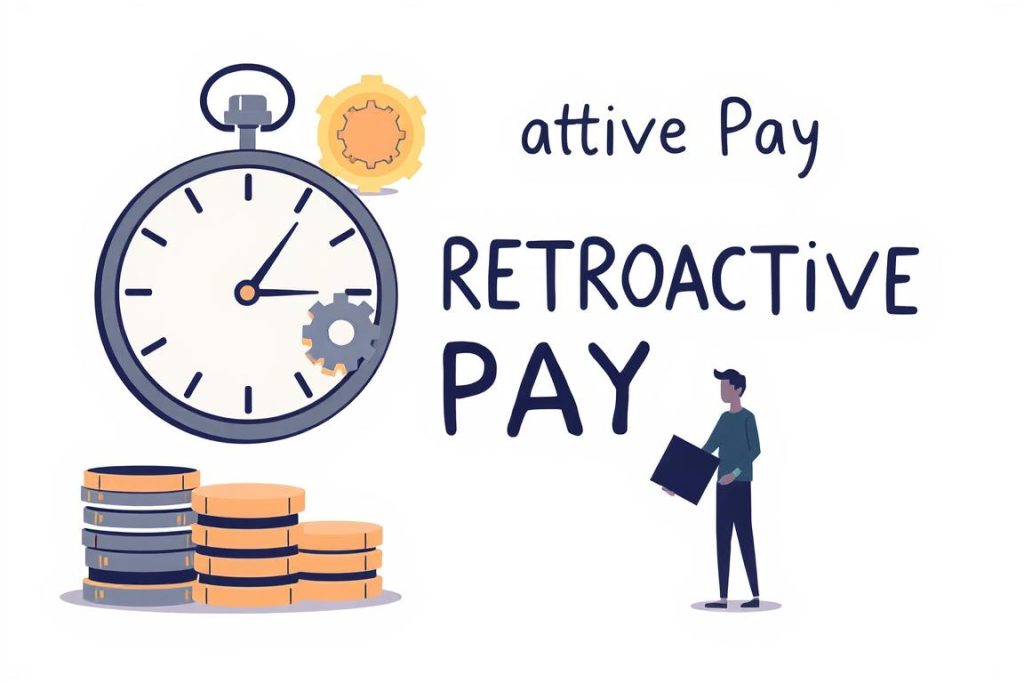Imagine getting your paycheck and something feels off. The numbers don’t seem right and your pay is less than you expected. This could mean you’re missing back pay – money you earned but didn’t receive. Or, it might be about a raise that hasn’t shown up yet, suggesting you might get retroactive pay. Knowing the details of salary arrears and wage restitution can turn worry into the joy of getting what’s yours.
It’s important to know the difference between back pay and retroactive pay for your financial health. They are both about money you should have, but they come up in different situations and affect your finances differently. It’s not just about missing a little money; it’s about making sure you’re paid correctly in the world of work. We’ll explore these important concepts so you can stand up for your rights and make sure you get every penny you’re owed.
Key Takeaways
- Discerning between back pay and retroactive pay is crucial for claiming any compensation due.
- Back pay represents wages that an employer failed to pay, while retroactive pay pertains to new salary rates applied to past pay periods.
- Adequate knowledge of salary arrears can safeguard your financial interests.
- Wage restitution is a facet of employee rights that requires due diligence.
- Empower yourself with financial clarity to effectively navigate compensation issues.
Demystifying Back Pay: What You Need to Know
Understanding back pay is key to ensuring you get paid fully for your work. It covers wages earned but not received. It ensures you get what you were promised, bringing fairness to your compensation.
What Exactly is Back Pay?
Back pay means the money owed to employees for work they did but weren’t paid for yet. It could involve unpaid overtime, minimum wage issues, or errors. Essentially, it corrects wage mistakes, ensuring workers receive what they earned.
The Legal Framework Surrounding Unpaid Wages
The Fair Labor Standards Act (FLSA) protects workers from wage shortfalls, focusing on minimum wage and overtime. State laws can add more protection, helping employees get their unpaid wages.
How to Identify If You’re Owed Back Pay
To find out if you’re due back pay, check your job details and pay records. Look for paychecks that don’t match up, cuts in pay, or missing overtime pay.
- Review your employment contract for agreed upon wages.
- Check your pay stubs against your work hours.
- Note any changes in your pay without notification.
Stay alert and informed about your rights to claim what you’re owed. Financial compensation goes beyond just the money. It’s about fairness and valuing your work effort.
Decoding Retroactive Pay: Understanding Your Entitlements
When talking about retroactive pay, it’s key to know what it is and how you can get it. Retroactive pay means pay adjustments made for work you’ve already done. This happens often after salary increases or delayed wage talks.
Retroactive pay can come up in different situations, like after a labor dispute is settled or when a company updates its pay policies. It’s quite common in jobs with unions, where salary negotiations happen collectively.

To make sure you’re getting all your outstanding salaries, keep up with any pay structure changes at work. Know what’s going on in your field and speak up in HR meetings about financial issues. Being active can lead to pay corrections that reflect your work’s true value.
Knowing how retroactive pay works helps you fight for fair pay. Check your salary regularly and watch for contract changes. This protects your right to any salary increases you deserve.
Sometimes, getting retroactive pay fixes mistakes in your salary or updates it due to policy changes. It’s important to know about this part of your pay.
Retroactive pay isn’t just fixing mistakes. It shows that your company values your work, often updated in annual reviews or after policy changes. Make sure you’re paid correctly as you grow professionally.
Comparing Back Pay and Retroactive Pay: Key Differences
It’s very important to know the differences between back pay and retroactive pay. Both terms deal with money you are owed, but they work in different ways. This can affect how much money you get back.
Salary Arrears vs. Wage Restitution: A Detailed Comparison
Past-due compensation involves two main types: salary arrears and wage restitution. Salary arrears happen when you don’t get paid for work you’ve already done because of wage violations. On the flip side, retroactive pay changes come from updates in pay scales or raises. It means your wage restitution will be reflected through retroactive pay adjustments.
The Impact on Your Paycheck: What to Expect
Retroactive pay adjustments and back pay claims can affect your earnings in different ways. If you get retroactive pay, expect a one-time lump sum in your paycheck. It covers what you should have been paid before. Back pay could be given all at once or in parts. It depends on how your claim for outstanding salaries is settled.
Negotiating Compensatory Wages: Tips and Strategies
Negotiating for the wages you deserve can seem tough, but being well-informed helps. Make sure to keep a record of all talks. And consider getting legal advice to deal with outstanding salaries and wage restitution. Being prepared is key to successfully negotiating for what you’re owed.

Conclusion
Understanding the difference between back pay and retroactive pay is crucial. It’s about knowing your rights. This isn’t just book learning—it’s power in your hands. You need this knowledge to fight for what you deserve.
Whether it’s about getting paid for past work or adjusting your salary for its current value, this understanding is key. It’s essential for standing up for your financial rights.
On your career path, always watch your pay carefully. Check your pay statements often. Learn about your employer’s pay rules. And if something looks wrong, speak up. Your work is precious.
Make sure you get every dime you’ve earned. It’s your right, and it shows respect for your efforts.
Stay sharp on issues like back pay and retroactive pay. With clear understanding and action, you protect your financial value. Awareness and effort make sure your pay matches your hard work and loyalty.

